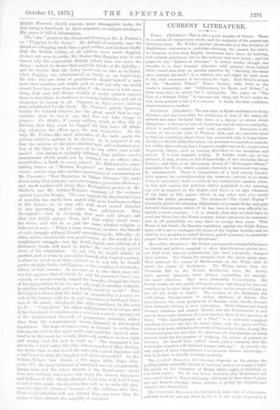Macmillan. (October.)—Mr. Seeley continues his thoughtful lectures on history and
politics, essaying to show that the great parties have not held their dogmas continuously, but have repeatedly changed their policies. The Tories, for example, wore the peace party once. They arrested the course of Marlborough, as Gm Whigs tried to arrest the course of Wellington. Tha Whigs, again, from the Exclusion Bill to the French Revolution, were, Mr. Seeley says, against progress, were always contending for ancient, not novel liberties. They were profoundly Conservative. Mr. Seeley works out this thesis with great pains, and though he does not convince us, ho does bring into prominence entire strata of facts we are all too ready to forget. The account of the Malakaui, tho milk.eating Presbyterians, or rather, Quakers, of Russia, who have become the most prosperous of Russian scot!, chiefly through their domestic virtues, is most interesting. Their villages arc found throUgh southern and eastern Russia, and the Government is said now to have some intention of concentrating them in the province of Kars. "The Autobiography of a' Thief" is a curiously complete specimen of argot, but has no other video ; and the paper on Vivi- section is at least entitled to the credit of humanity in idea, though Mr- Greenwood goes too far when ho sanctions all experiments on living animals made for the purpose of studying the action of poisons or diseases. He should have added, "made with a certainty that the knowledge acquired will diminish human suffering." At present, the only object of many experiments is to increase !lumen knowledge,— that is, in fact, to gratify scientific curiosity.
































 Previous page
Previous page